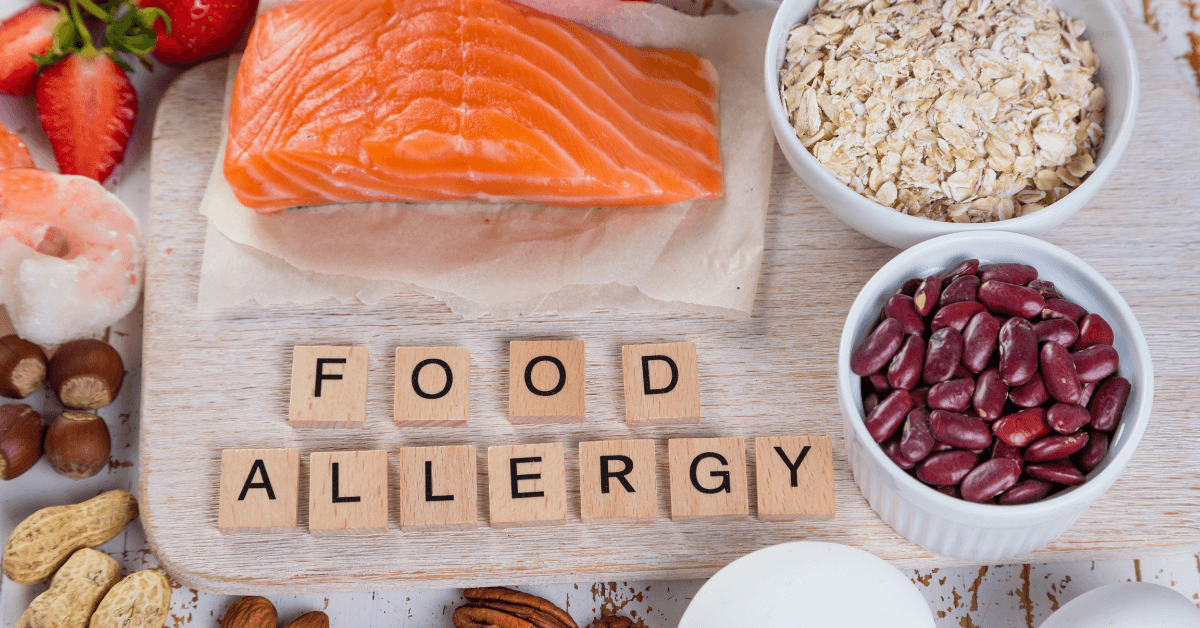Food allergies occur when your immune system reacts against specific food proteins. Then, your body will trigger an abnormal response to these foods. When this reaction occurs, your immune system reacts as though these proteins are harmful pathogens and responds against them.
This response will activate the release of the antibodies called Immunoglobulin E or IgE to neutralize the allergen. Therefore, each time your body senses that food, the IgE antibodies immediately alert the immune system. In return, your immune system will release histamine and other chemicals into your bloodstream. The release of these chemicals will bring about allergic reactions.
Approximately 5% of adults and 8% of children are affected by food allergies. The number of reported food allergy cases is continually increasing. Although most of the known allergies start during childhood, children, in most cases, generally outgrow them. Nevertheless, there are cases where these children do not outgrow these allergies. In contrast, some rare instances of allergies start during adulthood.
The Most Common Food Allergies and Their Effects
Although food allergies can come from various food items, the most common food allergies take the lion's share of 90% of known food allergies. These common allergies are known as the Big-8. Here are the main food items under the Big-8:
- Fish
- Eggs
- Milk
- Nuts including walnuts, hazelnuts, pistachios, peanuts, and cashew nuts
- Lobster, Shrimps, crab, and shellfish
- Peanut and groundnuts
- Wheat
- Soya beans

Common Allergies for Children
Children's typical food allergies are mainly eggs, peanuts, and milk. Medical reports show that most children will outgrow soy, eggs, milk, and wheat allergies. In addition, only a tiny percentage of these children will grow out of peanut allergies.
Symptoms of Food Allergies
A food allergy is different from a food intolerance even though the symptoms are closely related. Although it is also a nuisance and will cause discomfort, food intolerance will have less severe reactions. Food allergies can be life-threatening, food intolerance does not involve the immune system, so it is not lethal.
While some allergies may be light and only uncomfortable, some other reactions are dangerous. The allergy symptoms will constantly develop shortly after eating the food, from two minutes to up to two hours. Here are the most prominent allergy symptoms:
- Swelling of parts of the body, including the throat, tongue, lips, and face
- Diarrhea, stomach pains, vomiting, and nausea
- Fainting and dizziness
- Lightheadedness and loss of focus
- Itching inside the mouth and throat
- Eczema and hives
- Breathing problems and wheezing
- Nasal congestion
- Anaphylaxis

Who Is at Risk of Allergic Reactions?
Many factors constitute risks for allergic reactions. These factors will include the following:
1. Family History
You are at risk of having food allergies if there is a history of asthma, hives, allergies, and eczema in your family. History of hay fever and pollen syndrome is also a pointer to a family history of allergic reactions.
2. Age
Food allergies are prevalent in toddlers and babies. Their digestive systems will outgrow them as they become established.
3. Asthma
Asthmatic people will usually have allergic reactions as asthma is an allergic reaction to certain conditions. Note that when the food allergies and asthmatic symptoms appear together, they are sure to be very severe.
4. Other Allergies
People with an allergy are more likely to become allergic to something else. Moreover, people with other allergic conditions like asthma, hay fever, or eczema are more likely to have food allergies.
Prevention
Allergies are not entirely preventable, but there are ways that you can bring them down. To do that, you have to be fully aware of your conditions and take active measures. These are measures you can take to reduce the risk of allergic reactions.
- Early Exposure to Allergy causing foods: Early exposure to peanut protein like peanut butter and other peanut-containing snacks will reduce the child's risk of being allergic to the peanut as an adult. Therefore, it is safe to say that early introduction will lower the risk of peanut allergy.
- Take Precaution: A food allergy means that your body will sense that ingredient every time you ingest it and send alarm bells to your immune system. So, you will have this allergic reaction as many times as you consume it. Therefore, avoid such foods. Nonetheless, when you visit restaurants and hotels, take the following precautions to prevent an allergic reaction.
- Identify the food you are eating: Read the food labels carefully and when you are unsure, ask. Take care not to have a meal whose ingredients you have not confirmed. Make sure the feed does not contain anything that will bring about allergic reactions for you. Let the chef or the server know that you are allergic to certain foods. Please don't be shy about it. Sharing the information will save you inconveniences and possibly life- threatening situations.
- Wear a Band Or Necklace: If your allergic reactions are so severe that you may be unable to communicate, wear a medical necklace or band. The armlet or necklace should indicate your allergies. These will be helpful if you ingest the food without knowing and have a reaction that may render you unable to communicate.
- Plan For your Meals and Snacks: If you or your child can't have a particular snack or cake at a party, speak out. You can even bring your self-approved selection. Don't let anyone coerce you into eating something you know is unsuitable for you. If possible, pack your and your child's snacks when you travel to ensure they are free of any collagens.
- Inform Key Persons If your Child is allergic to food: If your child suffers from allergies, talk to the school, child care providers, or anyone with whom you will leave your child. Stipulate the importance of avoiding particular foods with collagen and explain that an allergic reaction could be life-threatening. In addition, teach your child to explain the allergies and ask for help in case of an allergic reaction.
- Write out A Plan of Action: Describe how to care for your child in case of an allergic reaction after consuming allergens. Circulate copies of this action plan to the school or child care and any other place the child may spend without you.
- Let Your Child Have a medical chain or Bangle: Having your child wear a medical band or chain will alert the people around them. The necklace or Bangle should outline the allergies, the symptoms, and how others can help in case of an allergic reaction.
How Food Allerigies Affect Your Body

A food allergy will occur when your body reacts to a food allergen. The immune system will receive the alert by releasing leukocytes, antibodies, and mast cells to fight the allergen. Because the mast cells are mainly concentrated in the skin, nose, lungs, throat, and digestive tract, most allergic reactions will mostly occur in these areas.
Since these areas are the most susceptible, some allergic reactions also become very severe. Some of these allergic reactions will be extreme, like anaphylaxis. While these more serious reactions require urgent medical attention, others are mild with no noticeable effects. Nevertheless, they will all affect your body. Here are some ways the allergic reaction will affect parts of your body.
- Your Skin: Foods like nuts, eggs, wheat, dairy products, and soy may cause a skin rash known as eczema. It presents itself as dry and inflamed skin and will occur due to eating or touching the said foods. In addition, urticaria or hives will appear due to eating peanuts, shellfish, and eggs. You may need treatment to reduce the inflammation, which can cause itching, pain and can accelerate the disease.
- The Digestive System: Although digestive tract symptoms can confuse food allergies and food poisoning, both occur in the gastrointestinal tract. The main difference is that food intolerance is based on the amount consumed. At the same time, food-allergic directly relates to substance, regardless of the quantity.
- Cardiovascular System: Since mast cells are concentrated around the heart, the heart's functioning and the vessels surrounding it are affected during an allergic reaction. These symptoms indicate anaphylaxis which is very severe and will need emergency medical attention.
- Respiratory System: Respiratory issues like coughing, wheezing, shortness of breath, and trouble swallowing can occur even from inhaling food or dust particles. These conditions can also happen once you eat foods with allergens. Such cases are accompanied by skin and gastrointestinal symptoms. The allergens can also cause asthmatic reactions. Respiratory symptoms could signal anaphylaxis. Thus, it is paramount to seek medical attention in such reactions urgently.
Summary
Food allergies can cause minor and debilitating conditions that can affect your well-being. You can avoid falling into the trap of food allergies by avoiding foods that trigger the disease. Thus, it's critical to be aware of foods that can lead to allergic conditions. Arming yourself with information can enable you to manage the situation properly. This article has explored various aspects of food allergies, including its causes, the Big-8, symptoms of the condition, and how to prevent it.





